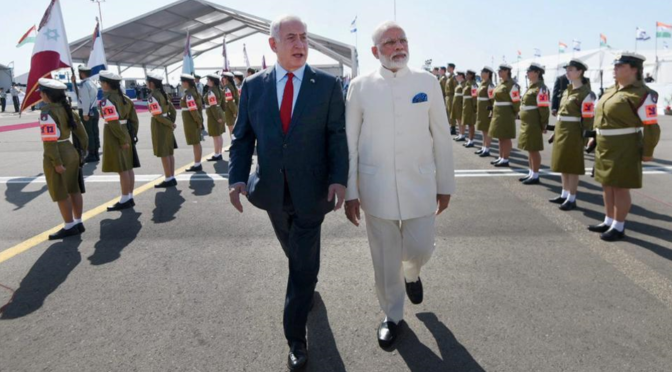Modi in Israel: Uncovering the Veil (Continued)
Posted on : July 23, 2017Author : Admin2

Dissecting Narendra Modi’s recent visit to Israel and attempting to comprehend its ramifications after the instant exhilaration has died down is by any yardstick not an attractive proposition or a simple chore. For one, public interest in a much hyped impending visit and during the course of the stay is far greater than after it is concluded. The end of the visit almost always invites a sense of closure.
The visit abounded in imagery. From the Israeli point of view, the symbolism associated with the first ever visit of the prime minister of India, a nation, which not long ago insisted that its passports are “valid for any country except Israel,” was of great significance. The formal invitation to the Israeli prime minister to visit India, the complete absence of any reference to Iran and Palestine during the course of the Indian prime minister’s visit perhaps corroborated Netanyahu’s claim that Israel’s foreign policy can be de-hyphenated from the peace process.
The tangible achievements for both Israel and India from the “historic,” “path breaking” visit comprise a total of seven agreements on areas including space, technology, water and agriculture. Precisely, seven Memorandums of Understanding (MoU) were signed for setting up of India-Israel Industrial R&D & Technological Innovation Fund (I4F), for Water Conservation in India, on State Water Utility Reform in India, India-Israel Development Cooperation-3 Year Work Program in Agriculture 2018-2020, Plan of Cooperation regarding cooperation in Atomic Clocks, regarding cooperation in GEO-LEO Optical Link and regarding cooperation in Electric Propulsion for Small Satellites.
Yet, doubts regarding the “permanence of the moment” remain. An editorial in Haaretz reminded its readers about the crucial hazard associated with a likely friendship with India, specifically, its democracy. Comparing and contrasting it with the decision making apparatus in China, the editorial pointed out that the possibility of a transferal of power in the Indian parliamentary democracy where its politicians are accountable to the electorate. As such, a government led by the opposition Congress could prove to be less accommodating and supportive in comparison to the current dispensation. Moreover, a sudden turn of events such as a confrontation with the Hamas or Hezbollah or an arms transaction with China and Pakistan, India’s principal competitors could transmute Israel’s status from a prospective ally to an impediment.
While, by and large the Indian media like its Israeli counterpart was supportive of what was termed as a “pragmatic” and “strategic” move, there were the intermittent voices of disapproval that called for retrospection and restraint. By negating the very existence of Palestine as though it were almost a “myth,” the current dispensation could in actuality deprive India of the opportunity to play a part in the quest for a just and amicable solution to the Israel-Palestine conflict. This section of the academia and press drew comparisons between what was referred to as the dominant ideologies of Zionism and Hinduvta; the perceived underlying common philosophy of the new found overt affability between the two nations with an emphasis on the centrality of “militant nationalism” and the marginalization of the subservient “other.”
One of the intangible concomitants of the visit for India as Robert Jenkins terms it is the possible import or perhaps reinforcement of the notion of “a nation under siege,” a feeling that is evidently distinguishable in the dominant Israeli (Jewish) psyche. Importing weapons from Israel could be a practical necessity; however, imbibing a political state of mind as a corollary could have grave consequences for a nation that is grappling with problems of contestation and managing dissent. While the influence of the tactics employed by the Israeli Defense Forces on its Indian counterpart cannot be missed, the spread of any such influence to the civilian ethos could spell imminent danger. Emphasising upon economic efficiency and good governance as qualities that are worth emulating is perfectly justifiable but not at the expense of social and political inclusiveness and lucidity.
While oversimplifications/generalizations and binary constructs should be circumvented, essentially, the policy choices for India appear to be one between political expediency and farsightedness.
(Concluded)
Priya
22/7/2017





Leave a Reply